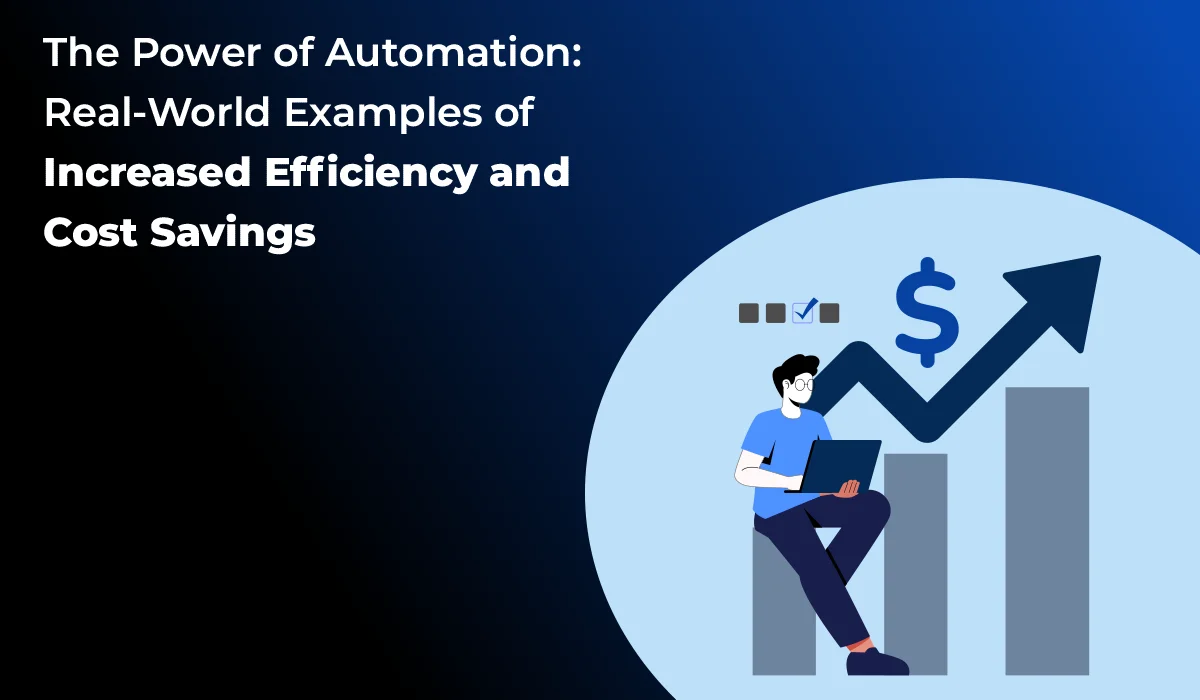The Power of Automation in Reducing Costs and Boosting Efficiency

Published on: April 12, 2023
Updated on: February 10, 2025
3915 Views
- Marketing Automation
17 min read
Are you sick and tired of the constant slog that is daily operations? Do you ever wish there was a way to automate all the monotonous tasks that take up your time and energy?
We have some good news for you, though: automation is no longer simply a fantasy. It's a technology that's transforming the way businesses function for the better. So,
what is automation exactly?
Simply put, it is the application of technology to tasks that were previously performed by humans. Automation helps you optimize your business operations and free up your valuable time for more vital work, whether it's basic activities like arranging appointments or sophisticated procedures.
Why is everyone talking about automation?
To begin with, it can greatly improve your efficiency and lower your expenditures. You'll be able to do more in less time by automating monotonous processes. Additionally, you will be able to eliminate errors and enhance accuracy, resulting in happier customers and better outcomes.
Automation is not limited to large enterprises. Indeed, automation can help level the playing field, allowing you to compete with and remain ahead of the big boys. In this blog, we'll look at the power of automation and look at real-world instances of firms that have effectively adopted automation to boost efficiency and save money.
Understanding Automation in the Business World
The use of technology to do activities that would ordinarily need human interaction is known as automation. This might range from simple administrative activities to more complicated procedures like decision-making or analysis. Automation helps businesses streamline processes, decrease costs, and boost efficiency.
Business automation has existed for centuries, with the use of machinery to automate operations reaching back to the industrial revolution. Automation, on the other hand, has become considerably more sophisticated and pervasive with the emergence of digital technology. Today, organizations of all sizes and across all sectors are seeking methods to automate their operations to gain a competitive advantage.
Automation can be used in almost any process that can be simplified or optimized via the use of technology. Manufacturing and production operations, for example, can be automated by utilizing robotics and other technology to boost efficiency and save costs.
Marketing and sales activities can be automated using AI and ML to assess client data and deliver customized suggestions. Chatbots and other technologies can be used to automate customer care procedures to give consumers quick and efficient help.
Robotic Process Automation (RPA)
RPA is a type of automation that involves the use of software robots or bots to do repetitive, rule-based activities that do not require human judgment. Data input, data processing, and other administrative functions can be programmed into RPA bots.
These bots can be trained to complete jobs in the same manner that humans do, and they can operate around the clock without taking breaks, vacations, or sick days. RPA can help you save money, enhance accuracy, and boost productivity.
Artificial Intelligence (AI) and Machine Learning (ML)
AI and ML are data-driven technologies that can generate predictions and suggestions. AI involves the development of robots capable of doing activities that would ordinarily need human intellect, such as interpreting language, recognizing pictures, and making decisions.
ML is a subset of AI in which algorithms are trained to learn from data and generate predictions based on that data. AI and machine learning is used in a variety of commercial operations, including customer support, marketing, and sales. For example, an AI-powered chatbot is used to give help and answer consumer questions, whilst an ML algorithm can be used to analyze customer data and provide insights into customer behavior.
Cognitive Automation
Cognitive automation is a type of automation that blends artificial intelligence (AI) with robotic process automation (RPA) to do more sophisticated activities that involve cognitive abilities such as thinking, judgment, and decision-making.
This sort of automation helps with duties like fraud detection, compliance monitoring, and risk assessment. Cognitive automation aids in the reduction of errors, the improvement of accuracy, and the enhancement of productivity.
Internet of Things (IoT)
The Internet of Things (IoT) is a network of physical devices, cars, buildings, and other items that are equipped with sensors, software, and network connectivity to gather and share data.
IoT is used to automate processes like equipment monitoring, inventory tracking, and supply chain optimization. IoT assists in lowering costs, increasing efficiency, and improving customer satisfaction.
Comparison of Automation Tools
| Automation Tool | Benefit | Impact on Business Functions |
|---|---|---|
| Robotic Process Automation (RPA) |
Streamlined and efficient repetitive tasks Error reduction and enhanced accuracy 24/7 continuous operations Increased productivity and cost savings Improved process scalability |
Improved process efficiency and productivity, and cost savings Fewer errors and reduced manual intervention and higher accuracy Nonstop task execution without breaks Increased output with reduced labor costs Easily adapt to changing business demands |
| Artificial Intelligence (AI) |
Advanced data analysis and pattern recognition Personalized customer experiences Predictive analytics for better decision-making Natural language processing for chatbots and virtual assistants Automation of complex tasks |
Better decision-making through data insights Enhanced customer engagement and satisfaction Anticipate trends and optimize strategies Enhanced customer support and service Handle intricate processes and workflows |
| Cognitive Automation |
Blends AI with RPA to handle more sophisticated tasks Fraud detection, compliance monitoring, and risk assessment Reduces errors and enhances accuracy in cognitive tasks Assists with tasks involving thinking, judgment, and decision-making |
Improved decision-making with cognitive capabilities Enhanced accuracy and productivity in complex tasks Improved efficiency and risk management Improved accuracy in critical business processes |
| Internet of Things (IoT) |
Real-time monitoring and data collection Remote asset management Enhanced supply chain visibility Predictive maintenance for machinery and equipment Improved customer service through connected devices |
Immediate access to critical data and insights Efficiently manage and monitor remote assets Improved tracking and coordination of supply chain activities Reduce downtime and maintenance costs Seamless and personalized customer experiences |
